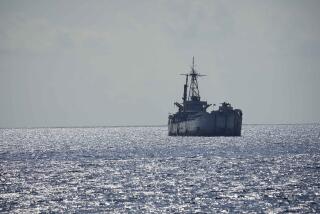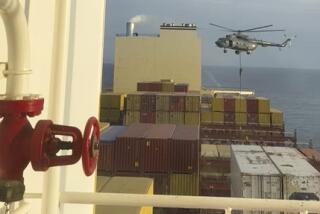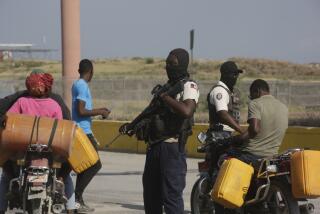U.S. captain rescued; 3 Somali pirates killed
- Share via
WASHINGTON AND DJIBOUTI — After days of tense negotiations, the U.S. Navy rescued an American sea captain in seconds Sunday, with snipers shooting three Somali pirates who officials feared were about to kill him.
The commanding officer of the U.S. guided missile destroyer Bainbridge had received approval from President Obama to attempt a rescue of Capt. Richard Phillips by force if his life appeared to be in imminent danger after five days of captivity off the coast of Somalia.
With the seas in the Gulf of Aden getting choppier and the increasingly agitated captors pointing an automatic weapon at Phillips, Cmdr. Frank Castellano decided he had no other option, Navy Vice Adm. William Gortney said.
Castellano gave the green light, and sharpshooters on the fantail of the naval warship opened fire on the partially exposed pirates aboard the small enclosed lifeboat.
Phillips, who was bound and standing, was not injured in the rescue, which occurred just after dark at 7:19 p.m., said Gortney, commander of the U.S. Naval Forces Central Command. He gave an account of the rescue operation and the events leading up to it in a Pentagon conference call Sunday evening from the Persian Gulf nation of Bahrain.
Phillips’ three captors, who were armed with AK-47 assault rifles and small-caliber pistols, probably were killed instantaneously by the snipers. “We pay a lot for their training and we earned a good return on their investment tonight,” Gortney said.
A fourth pirate, who was aboard the Bainbridge negotiating with the Navy over Phillips’ release, was taken into custody by U.S. authorities.
After the rescue, Phillips, 53, was whisked to safety aboard the San Diego-based amphibious assault ship Boxer nearby, given a routine medical evaluation and was “resting comfortably,” Gortney said.
Gortney said sailors on the Bainbridge had passed a note to Phillips from his wife, Andrea, that said, “Your family loves you, your family is praying for you, your family is saving a chocolate Easter egg for you unless your son eats it first.”
“Well, Mrs. Phillips, keep your son away from those Easter eggs, his dad’s headed home,” Gortney said.
Phillips was taken hostage Wednesday when the pirates attempted to seize his cargo ship, the Maersk Alabama. On the Boxer, military officials confirmed that the soft-spoken captain had placed himself at risk in an effort to protect his crew, helping fight off the pirates and then offering himself as a hostage.
The pirates kept Phillips aboard the 24-foot lifeboat and repeatedly threatened him. They were seeking millions of dollars in ransom.
“His courage is a model for all Americans,” Obama said in a statement released Sunday by the White House.
Asked if he had any message for a public that had been captivated by his ordeal, Phillips was self-effacing.
“The real heroes are the Navy, the Seals, those who have brought me home,” he told John Reinhart, president and chief executive of Maersk Line.
Gortney and other military officials said they feared the rescue could provoke retaliation from Somali clans. He said the solution lay in going after the pirates on land in Somalia and other havens where they have flourished amid “lawlessness, lack of government and economic instability.”
Local news reports quoted some Somali pirates as saying Sunday that they planned to step up their activities, and that they would kill hostages before they could be killed themselves.
In nearby Mombasa, Kenya, where the Maersk Alabama had arrived Saturday without its captain, the crew erupted in celebration when news of his release came through. Two flares were fired in the air and the ship’s horn sounded. Nine crew members, one wrapped in an American flag, came to the stern, pumping their fists.
“He’s one of the bravest men I’ve ever met,” one of them shouted to reporters, referring to Phillips. “He’s a national hero.”
Friends and family in Phillips’ hometown of Underhill, Vt., were more subdued. Many said their Easter prayers had been answered; his family asked for privacy. Alison McColl, a family friend, read a brief statement to reporters outside the Phillips home, saying the captain and his wife had spoken by phone.
“I think you can all imagine their joy, and what a happy moment that was for them,” said McColl, according to the Associated Press.
In Washington, Obama praised the military and other U.S. officials involved in Phillips’ rescue. But he too warned that though the first known hostage-taking of an American merchant seaman in more than a century was over, the broader problem of piracy on the high seas was not.
In his statement, Obama vowed to take steps to prevent such occurrences, especially in the waters off the Horn of Africa.
The Maersk Alabama, an American-flagged and Danish-owned vessel, had been carrying humanitarian aid to Africa. Since the attack, Phillips and his captors had been floating in the life raft, out of fuel and shadowed by U.S. warships.
The captain jumped off the lifeboat Friday night and tried to swim for freedom, but the pirates quickly recaptured him.
The Pentagon did not release the identities of the four pirates. Gortney said discussions were underway with the Justice Department on whether the detained pirate could be tried in a U.S. court of law.
The rescue ended an incident considered one of the first tests of how the Obama administration would deal with the growing problem of international piracy.
Pentagon officials confirmed that the president had approved military requests to attempt rescues Friday and again Saturday.
But for much of the last four days, the situation appeared to be in a stalemate. FBI hostage negotiation experts and the military were careful not to portray themselves as being open to paying a ransom, but also hesitant to close off any opportunities to peacefully settle the crisis.
By Saturday, the U.S. negotiators had persuaded the pirates to allow them to send an inflatable boat out to the lifeboat with food, water and even a change of clothes for Phillips, Gortney said. That effort proved invaluable when one of the captors agreed to come aboard the Bainbridge to negotiate, and enough of a rapport was built that the warship was given permission to tow the lifeboat when bad weather caused the seas to get choppy and potentially dangerous.
It was during that tow that the snipers got a clear view of Phillips’ captors, Gortney said. “The on-scene commander made the decision that Capt. Phillips’ life was in immediate danger” after a de-escalation of the tension earlier Sunday proved short-lived.
The deadly rescue was a blow to Somali pirates who have for years preyed on international shipping and some of whom still hold hostage more than a dozen ships with about 230 civilian sailors from many nations.
Officials in Somalia’s transitional government welcomed the end of the hostage crisis, but said it underscored the need for the international community to do more to help the government bolster its security services.
“We are delighted,” Foreign Minister Mohamed Abdulahi Omaar said. “This is a capability that we need to be able to undertake ourselves.”
He said it was possible that the deaths of the three pirates could spur an anti-U.S. backlash among a small number of extremists, but that most Somalis would support and understand the American operation.
“People are fed up with gun-toting warlords, whether they are onshore or offshore,” he said.
Elders and family members of the pirates, who were gathered in the coastal village of Garacad, said they had begun to suspect something was amiss earlier Sunday after they lost contact with the pirates via satellite phone.
According to one elder, before the rescue, the increasingly desperate pirates had dropped their demand for ransom and asked that a hijacked Greek ship be permitted to approach them so they could escape.
Kulmiye Moalim Hassan, interviewed by telephone in the port city of Eyl, a pirate stronghold, said the Americans refused permission, raising the possibility that a rescue operation was underway.
--
edmund.sanders @latimes.com
Times staff writers Robyn Dixon in Mombasa, My-Thuan Tran in Los Angeles and a special correspondent in Mogadishu, Somalia, contributed to this report.
--
(BEGIN TEXT OF INFOBOX)
Dangerous waters
At least a dozen ships with more than 200 crew members are being held by pirates off the coast of Somalia, according to the International Maritime Bureau and NATO. A look at some recent pirate attacks:
--
April 11: Italian tugboat seized with 16 crew members: 10 Italians, five Romanians and a Croatian.
April 9: Yemeni fishing boat Shugaa Almadhi hijacked with 13 crew members.
April 6: British-owned bulk carrier Malaspina Castle hijacked in the Gulf of Aden. It is carrying iron and has a crew of 24 from Bulgaria, the Philippines, Russia and Ukraine. Lloyd’s Marine Intelligence Unit says it is owned by Navalmar U.K. and managed by BNavi of Italy.
April 4: German 20,000-ton freighter Hansa Stavanger seized 400 miles off the Somali coast. It has 24 crew members aboard: five Germans, three Russians, two Ukrainians, two Filipinos and 12 Tuvaluans. It is owned by Hamburg-based Leonhardt & Blumberg.
April 4: Taiwanese ship Win Far 161 seized near the Seychelles islands. It has a crew of 30: 17 Filipinos, six Indonesians, five Chinese and two Taiwanese.
March 25: Panama- registered, Greek-owned Nipayia with 18 Filipino crew members and a Russian captain is seized by pirates. The Nipayia is managed by Athens-based Lotus Shipping.
--
Source: Associated Press
More to Read
Sign up for Essential California
The most important California stories and recommendations in your inbox every morning.
You may occasionally receive promotional content from the Los Angeles Times.









